Seven good reasons for hydrogen propulsion and fuel cells
- Details
- Hits: 10211
Bosch relies on the Hydrogen power. Electric Cars are important to the CO2emissions lower in traffic. But the question arises whether it is also economical, difficult Commercial Vehicles with a payload of 40 t over long distances using battery power? Find out below why Bosch is developing the technology further and which portfolio the global player offers for this:
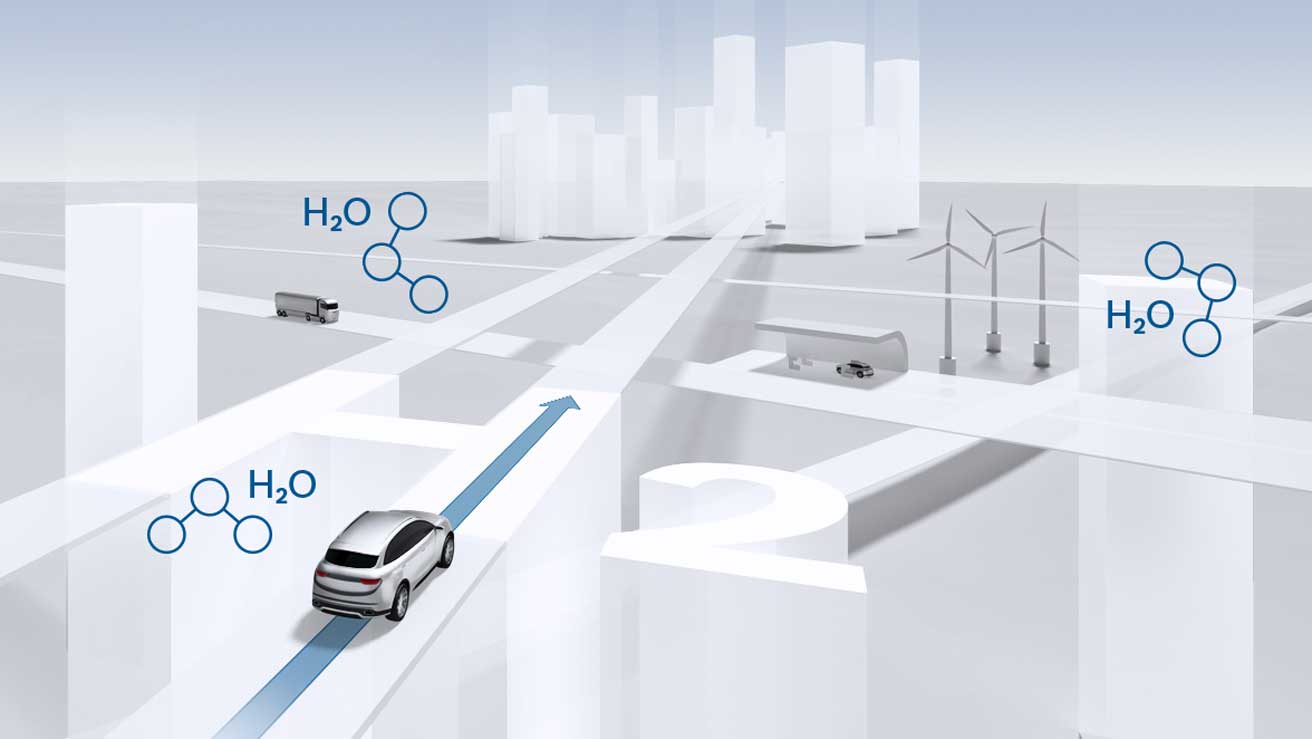
Contents
- Bosch expands portfolio for hydrogen drive
- The reasons for hydrogen propulsion
- 1. Fuel cells supplied with renewable electricity are climate-neutral
- 2. Hydrogen propulsion for trucks and airplanes
- 3. Better efficiency compared to electric drive
- 4. Production costs for fuel cells will decrease
- 5. Infrastructure is being expanded
- 6. No more dangerous than other fuels
- 7. The right time
- Nikola Motors relies on Bosch hydrogen drive
- Bosch starts series production of fuel cells
Bosch expands portfolio for hydrogen drive
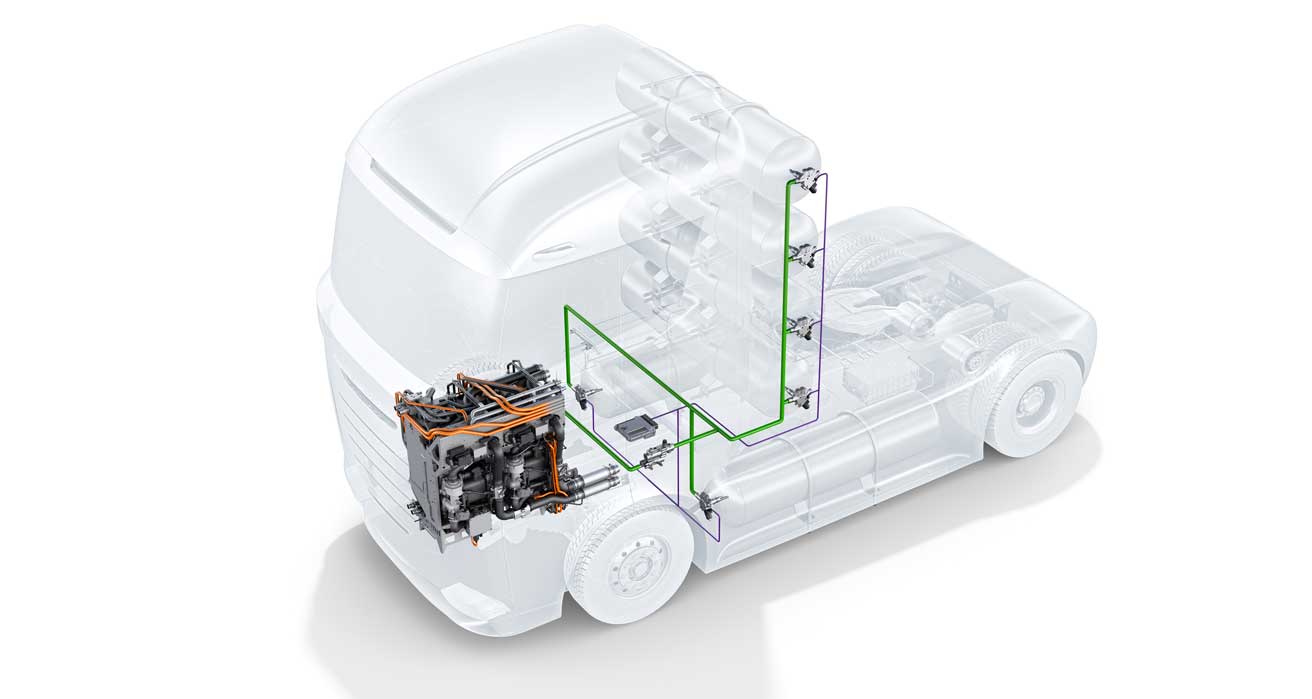
17.11.2021 | Bosch is expanding its product portfolio for mobile hydrogen drives. It is supplemented with components for H2 tank systems such as tank valves or pressure regulators. To this end, Bosch is collaborating with the Italian company OMB Saleri in a development partnership. "Hydrogen is an important building block in the future drive mix in order to achieve climate neutrality," says dr Uwe Gackstatter, President of the Powertrain Solutions division at Bosch. "Together with OMB Saleri, we are making H2 tank components ready for large-scale production."
Tank valves and pressure regulators for hydrogen tanks
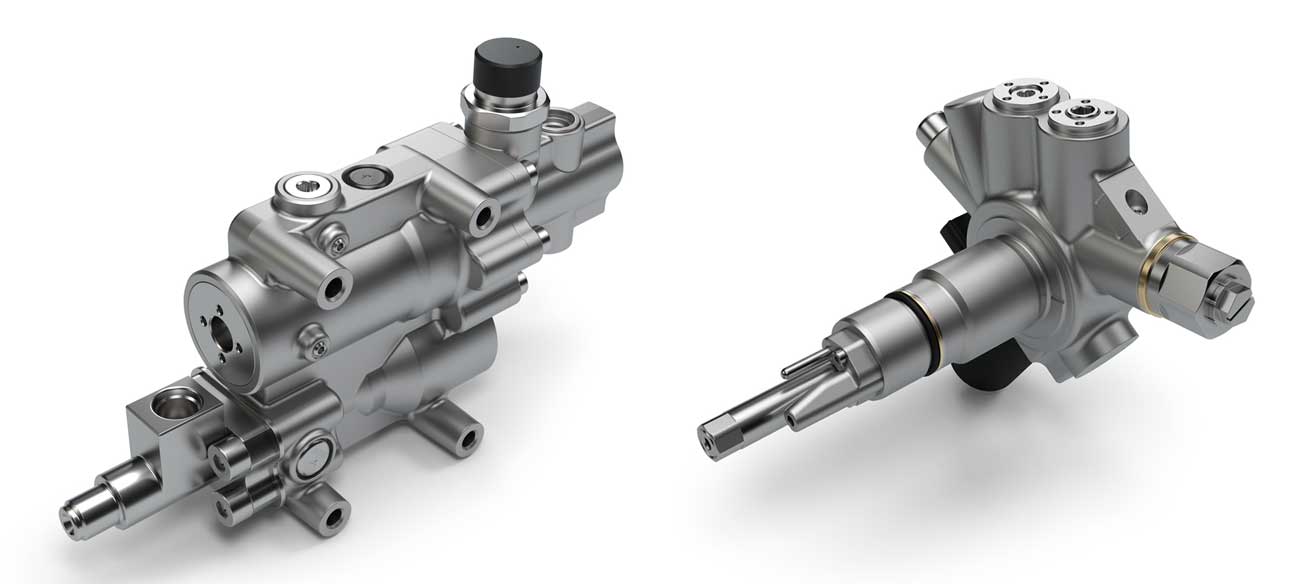
The demand for drives for hydrogen cars will increase significantly in the coming years, especially for commercial vehicles. Bosch assumes that by 2030 around every eighth newly registered commercial vehicle will have a fuel cell on board. With the cooperation around components for hydrogen tank systems, the cooperation partners want to expand their market positions in the H2 sector. The cooperation includes a license and development agreement for several products for hydrogen storage in the pressure levels 350 bar and 700 bar.
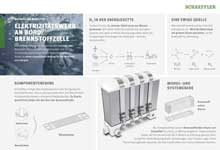 Components for the hydrogen drive in the mass market
Components for the hydrogen drive in the mass market
Common Simultaneous engineering teams develop the existing products further and optimize them for large-scale production with the aim of offering components for hydrogen tanks competitively on the basis of large quantities.
Bosch and OMB Saleri combine competencies
The cooperation brings together the know-how of both partners. OMB Saleri from Brescia in northern Italy is one of the world's leading specialists in components for hydrogen storage solutions. As a partner, Bosch benefits from the development expertise, the modern hydrogen test infrastructure and hydrogen test stations, as well as from products that have already proven themselves in initial applications. In return, Bosch contributes a global development and manufacturing network for large quantities and its experience in the industrialization of innovative products.
Bosch is working on mobile and stationary fuel cells
Bosch is making significant advance payments because the company is convinced of hydrogen as an energy source. Bosch is investing from 2021 to 2024 a good 600 million euros in mobile applications and 400 million euros in applications for stationary power and heat generation. The portfolio for vehicles includes individual ones Sensors, core components such as electric air compressors, the stack and complete fuel cell modules.
The reasons for hydrogen propulsion
Just because of the weight of the Batteries, their long charging times and the limited range, the current state of development of the electric motor for heavy-duty trucks is not ideal. In the near future, even 40-ton trucks will be able to travel over a thousand kilometers purely electrically. Fuel cell cars enable climate-neutral transport of goods and goods using regeneratively generated hydrogen.
 Edge Computing | Devices, applications and lots of tips
Edge Computing | Devices, applications and lots of tips
Bosch is developing the hydrogen drive primarily with a focus on truck. The company plans to go into series production in 2022/23. Starting with trucks, fuel cell drives from Bosch will also be increasingly used in cars in the future. There are seven good reasons why fuel cells and hydrogen are an integral part of the drive portfolio for the Mobility of the future will be:
1. Fuel cells supplied with renewable electricity are climate-neutral
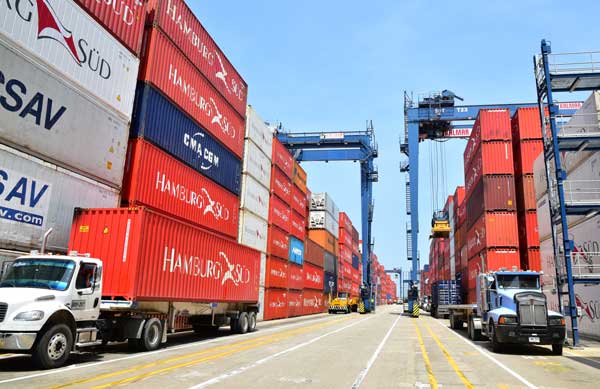 In a fuel cell, hydrogen reacts (H.2) with oxygen (O2) from the ambient air. Hydrogen is converted into electrical energy. This is used for hydrogen propulsion. This also creates heat and water (H.2O).
In a fuel cell, hydrogen reacts (H.2) with oxygen (O2) from the ambient air. Hydrogen is converted into electrical energy. This is used for hydrogen propulsion. This also creates heat and water (H.2O).
Hydrogen is per electrolysis won. Here, water is separated into hydrogen and oxygen with the help of electricity. If regenerative electricity is used, the fuel cell is completely climate-neutral. If you calculate the CO2 Output for production, operation and disposal together is the CO2 The balance sheet for large or heavy vehicles is better than for electric drives. In fuel cell cars, a significantly smaller battery is sufficient as an intermediate storage device in addition to the hydrogen tank.
This lowers the CO2-Footprintthat arises during manufacture is essential. "The fuel cell shows its advantages precisely in those areas in which the electric drive cannot score," explains dr Uwe Gackstatter, Chairman of the Bosch Powertrain Solutions division. "Fuel cells and batteries are therefore not in competition, but complement each other perfectly."
2. Hydrogen propulsion for trucks and airplanes
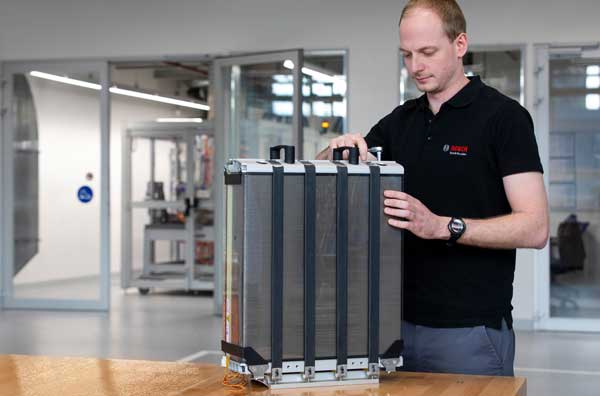 Hydrogen offers one high energy density. One kg H2 contains as much energy as 3,3 liters of diesel. A car needs around 100 kg for 1 km, a 40-tonne truck needs a good 7 kg. An empty tank can be filled with hydrogen in just a few minutes, just like conventional fuel.
Hydrogen offers one high energy density. One kg H2 contains as much energy as 3,3 liters of diesel. A car needs around 100 kg for 1 km, a 40-tonne truck needs a good 7 kg. An empty tank can be filled with hydrogen in just a few minutes, just like conventional fuel.
"The fuel cell is the first choice for the long range when many kilometers and larger loads have to be moved every day," says Gackstatter, summarizing the advantages. In the EU-funded H2Haul project, Bosch is currently building a small fleet of fuel cell trucks with other companies and putting them on the road.
In addition to mobile applications, Bosch fuel cells Stacks for stationary applications with solid oxide fuel cell technology (SOFC). These are to be used, among other things, in the form of small, decentralized power plants in data centers, cities and to operate charging stations for electric cars.
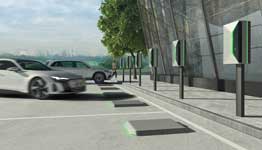 Electric vehicles worldwide wireless charging with open standards
Electric vehicles worldwide wireless charging with open standards
To the Paris climate protection goals In the future, hydrogen should not only power trucks and cars, but also planes, trains and ships. Even the energy and steel industries plan with H2.
3. Better efficiency compared to electric drive
How economical and climate-friendly a drive is depends on, among other things Efficiency from. For vehicles with a fuel cell drive, this is around a quarter higher than for those with internal combustion engines. The recovery of braking energy also increases efficiency.
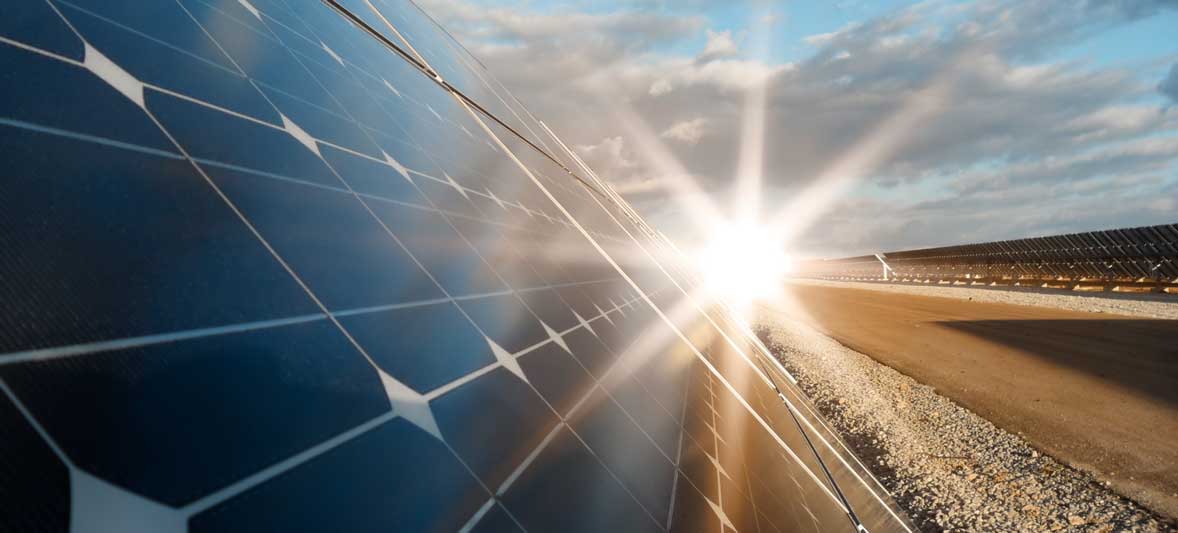
Battery electric vehicles are even more effective if they use the Store electricity directly in the vehicle and use it for propulsion. Because energy generation and energy consumption do not always coincide in time or space, von remains Wind energy and solar systems generated electricity is often unused. It cannot be saved and will then not find a buyer. It's different with hydrogen. With the excess electricity, it can be generated locally, flexibly stored and transported.
4. Production costs for fuel cells will decrease
As soon as larger production capacities are built and the prices for renewable electricity fall, so will the costs of producing green hydrogen decrease significantly. The Association Hydrogen Council with over 90 international companies expects H2 Applications in the next ten years that cut costs in half. This will increase the competitiveness of the fuel cell compared to other technologies.
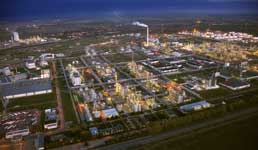 Green hydrogen on the advance in Germany
Green hydrogen on the advance in Germany
The heart of the fuel cell is the stack. Bosch is currently developing with the start-up powercell a stack ready for the market. Then it should be manufactured in series. The goal is a high-performance, cost-effective solution. “In the medium term, using a vehicle with a fuel cell will not be more expensive than with a conventional drive,” says Gackstatter.
5. Infrastructure is being expanded
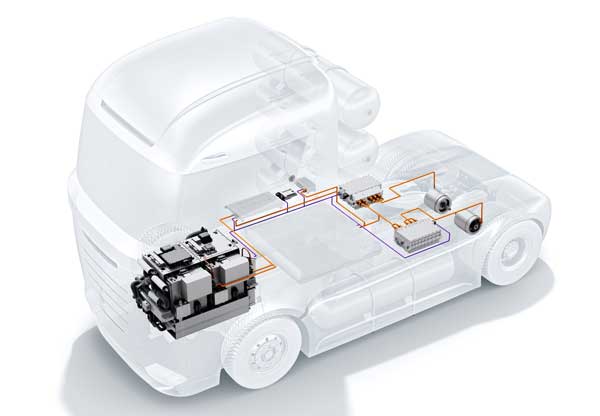 A network on Hydrogen filling stations is currently not available across the board. However, they cover around 180 Hydrogen filling stations already covers some important transport routes in Europe.
A network on Hydrogen filling stations is currently not available across the board. However, they cover around 180 Hydrogen filling stations already covers some important transport routes in Europe.
Companies from many countries are working together to further expand the infrastructure. They are often supported by government funding. In Germany too, politics has the role of H2 recognized as an important defossilization path and anchored in the National Hydrogen Strategy.
The joint venture H2 Mobility, for example, will set up around 2020 freely accessible filling stations in Germany by the end of 100. In the EU-funded project H2Haul in addition to the trucks, the required H2 Petrol stations are set up on the planned routes. There are also extensive funding programs in Japan, China and South Korea.
6. No more dangerous than other fuels
The use of gaseous hydrogen in vehicles is safe and no more dangerous than batteries or other fuels for automobiles. Hydrogen tanks also do not pose an increased risk of explosion. Although H is burning2 In connection with oxygen and above a certain ratio a mixture is explosive.
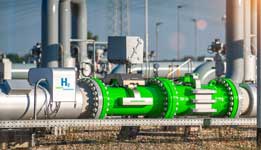 Reading tip: Measurement technology for hydrogen production
Reading tip: Measurement technology for hydrogen production
But H2 weighs about 14 times less than air and is therefore extremely volatile. For example, if hydrogen escapes from a vehicle tank, it rises faster than it can combine with the oxygen in the vicinity. In 2003, US researchers generated a flame in a fire test on a fuel cell vehicle. But this quickly went out and the vehicle remained largely undamaged.
7. The right time
The production of hydrogen is technologically controllable and proven. If there is sufficient demand, production could be ramped up quickly. The fuel cell is also technologically so developed that it can be used for industrialization and Mass application is in the starting blocks.
Given appropriate investment and political will, the Hydrogen Council says the hydrogen economy can become competitive in the next ten years. "The time to get started with the hydrogen economy is now," says Gackstatter.
Nikola Motors relies on Bosch hydrogen drive
26.08.2020/XNUMX/XNUMX | The startup Nikola Motors from Arizona wants to make transportation climate-neutral with hydrogen propulsion in trucks. Bosch is helping to make fuel cell drives for trucks suitable for the masses.
Bosch starts series production of fuel cells
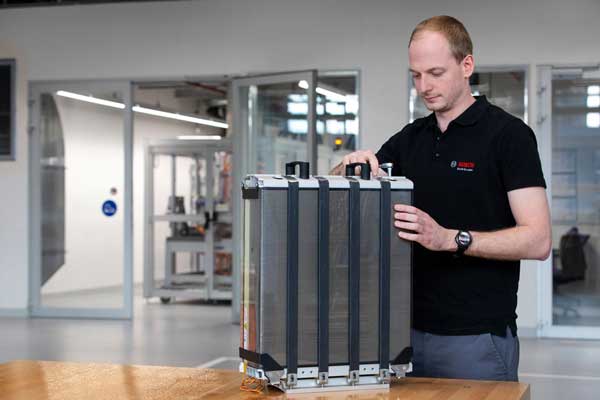 29.04.2019/XNUMX/XNUMX | Bosch enters the market for mobile fuel cells and prepares the breakthrough of technology for trucks and cars. The key to this is the stack, which, as the heart of a fuel cell, converts hydrogen into electrical energy. For the further development and production of stacks, Bosch has now entered into a cooperation with Powercell Sweden AB, manufacturer of fuel cell stacks.
29.04.2019/XNUMX/XNUMX | Bosch enters the market for mobile fuel cells and prepares the breakthrough of technology for trucks and cars. The key to this is the stack, which, as the heart of a fuel cell, converts hydrogen into electrical energy. For the further development and production of stacks, Bosch has now entered into a cooperation with Powercell Sweden AB, manufacturer of fuel cell stacks.
The agreement stipulates that both partners Stack on the basis of the polymer electrolyte fuel cell (PEM) to the point where it is ready for series production and that Bosch produces the technology in series for the global automotive market under license. The stack complements the portfolio of fuel cell components and should be on the market by 2022 at the latest.
For Bosch, the mobile fuel cell technology business is long-term Potential in the billions. According to Bosch estimates, up to 2030% of all electric vehicles worldwide will be powered by fuel cells by 20. Bosch sees the best opportunities for widespread use of fuel cell technology in commercial vehicle market. The fleet specifications of the European Union for trucks envisage a reduction in CO by 20252 emissions by an average of 15%, by 2030% by 30.
Bosch exhibits at the Hannover Messe 2022.
General technical knowledge
In the context of the fuel cell, the stack is a stack of fuel cells. It generates electrical energy that is used to drive hydrogen cars. In the series-connected fuel cells, chemical reaction energy from hydrogen and oxygen from the air is converted into electrical energy by means of cold combustion. This creates water, electricity and heat. No pollutants are left behind. Thus, the hydrogen drive is climate neutral.
You might also be interested in...

Artificial Intelligence | trends and developments

Reduce carbon footprint | That's how it's done!

